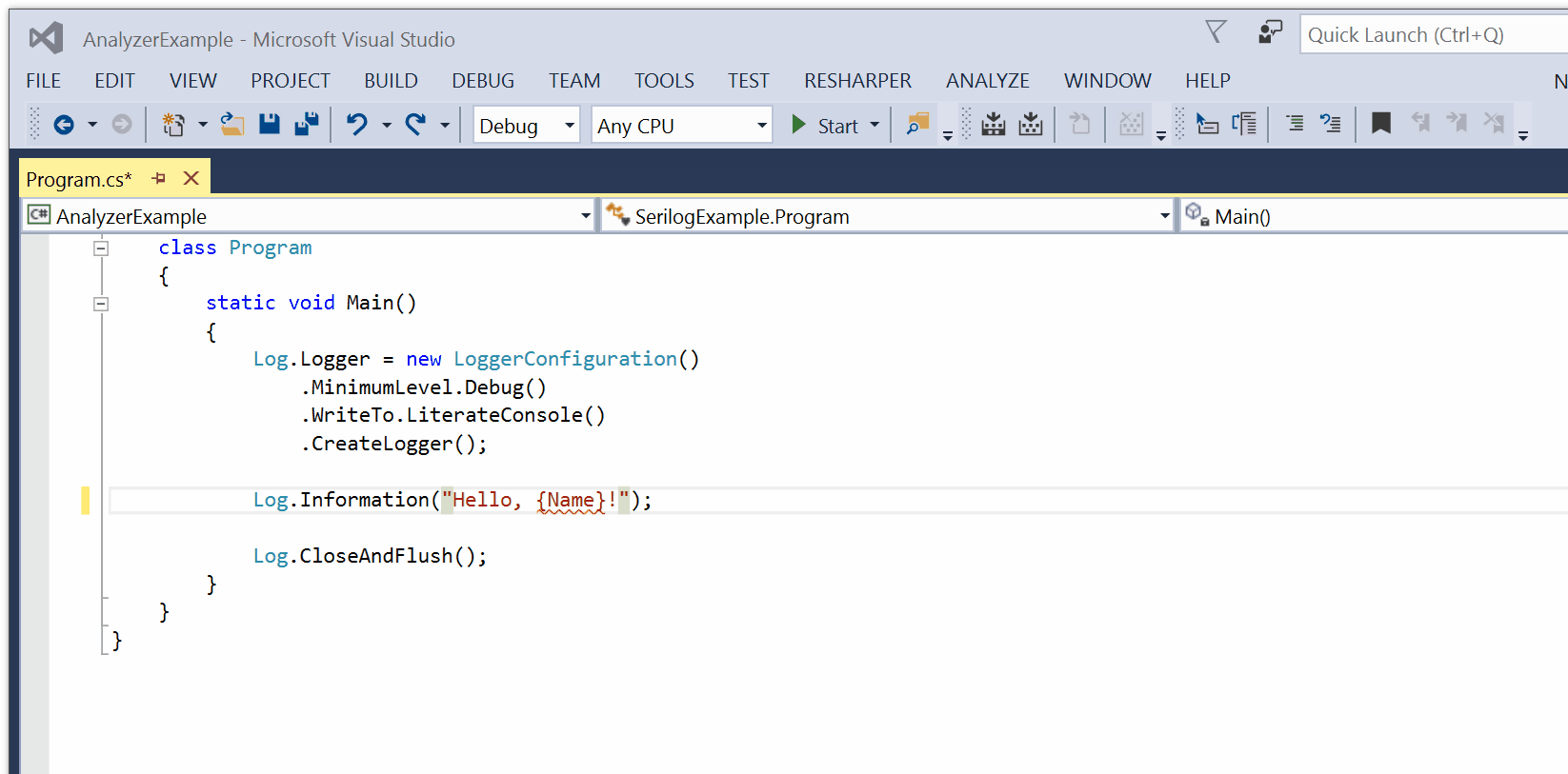SerilogAnalyzer
Roslyn-based analysis for code using the Serilog logging library. Checks for common mistakes and usage problems.

Installing (Visual Studio)
You can get the SerilogAnalyzer from various sources:
- Grab the VSIX from the releases list.
- Install it from Visual Studio Gallery.
- Install the NuGet package into your project.
Analyses
Serilog001: Exception Usage
Checks that exceptions are passed to the exception argument, and not as a normal property, with a code fix to correct it.
Detected incorrect usage:
catch (Exception ex)
{
Log.Error("Could not save {File}: {Error}", file, ex);
}The ex parameter is an exception, which Serilog has special handling for if passed as the first argument.
Correct usage:
catch (Exception ex)
{
Log.Error(ex, "Could not save {File}", file);
}Serilog002: Message Template Syntax Verifier
Checks message templates for correct syntax and emits an error if there's a violation of the templating syntax.
Detected incorrect usage:
Log.Information("Saving {File to {Directory}", file, directory);The first property token in the message template, File, is malformed.
Correct usage:
Log.Information("Saving {File} to {Directory}", file, directory);Serilog003: Property Binding Verifier
Checks coherence between the message template tokens and the supplied arguments.
Detected incorrect usage:
Log.Information("Saving {File} to {Directory}", file);Here the number of arguments passed to the method (1) is less than the number of tokens in the message template (2), so the second token in the message template, {Directory}, will have no value.
Correct usage:
Log.Information("Saving {File} to {Directory}", file, directory);Each property named in the message template needs to correspond to exactly one argument.
Serilog004: Constant Message Template Verifier
Checks that message templates are constant strings. This ensures that events with different data/format arguments can still be detected as instances of the same event.
Detected incorrect usage:
var errorMessage = TryToCheckOutOrder(...); // etc.
Log.Error(errorMessage);Because errorMessage generally contains failure-specific text ("Couldn't find order 123" ... then 124, then 125) the group of occurrences can't be located using the message template/event type.
This also degrades Serilog performance by filling its internal message template cache.
Correct usage:
Log.Error("Order handler failed with {HandlerError}", errorMessage);Correct usage is to always pass any variable data as a property to a message template.
A CodeFix is provided that converts string interpolation ($"{...}"), String.Format(...) and string concat ("value: " + value) to a message template
Serilog005: Unique Property Name Verifier
Checks that all property names in a message template are unique.
Detected incorrect usage:
Log.Information("Saving {Path} to {Path}", file, directory); In this example, because both properties in the message template have the same name, Serilog can only record one of them.
Correct usage:
Log.Information("Saving {File} to {Directory}", file, directory); Each property in a message template must have a unique name.
Serilog006: Pascal Cased Property Verifier
Checks that all property names in a message template are PascalCased.
Detected incorrect usage:
Log.Information("Saving {file} to {directory}", file, directory); A CodeFix is provided, that applies pascal casing.
Correct usage:
Log.Information("Saving {File} to {Directory}", file, directory); Serilog007: Anonymous objects use destructuring Verifier
Checks that all anonymous objects passed to the logger are destructured.
Detected incorrect usage:
Log.Information("Saving {File} to {Directory}", new { Name = name, Size = size }, directory); A CodeFix is provided, that applies the destructuring hint.
Correct usage:
Log.Information("Saving {@File} to {Directory}", new { Name = name, Size = size }, directory); Serilog008: Correct contextual Logger Verifier
Checks that contextual loggers are constructed with the correct type.
Detected incorrect usage:
class A
{
private static readonly ILogger Logger = Logger.ForContext<B>();
}
class B {}A CodeFix is provided, that uses the correct type.
Correct usage:
class A
{
private static readonly ILogger Logger = Logger.ForContext<A>();
}
class B {} Refactors
Performs static analysis on a fluent LoggerConfiguration call to generate configuration for use with either <appSettings> or appSettings.json
